 Martenitsa adds glamour to Bulgarian Embassy
Martenitsa adds glamour to Bulgarian Embassy
 Mysterious 'Dolan Tribe' in Xinjiang
Mysterious 'Dolan Tribe' in Xinjiang
 This is Shanghai
This is Shanghai
 Female attendants serving 'two sessions'
Female attendants serving 'two sessions'
 The many tears of DiCaprio
The many tears of DiCaprio
 Dan Dan's bittersweet opera life
Dan Dan's bittersweet opera life
 A dream wedding for a girl suffering from cancer
A dream wedding for a girl suffering from cancer
 Old photos of Anti-Japanese War (1937-1945)
Old photos of Anti-Japanese War (1937-1945)
 This is Beijing – Nanluoguxiang
This is Beijing – Nanluoguxiang
BEIJING, March 8 -- If China's high-end liquor producers had any doubts about the future prospects of the national frugality campaign that has hammered their profits, they will have been gulped down after important political remarks this week.
Under the patronage of a wealthy few, high-end booze makers had been doing comfortable business for quite some time despite their exorbitant prices. Now, however, they are realizing the cost of having distanced themselves from the masses, and are having to come up with new strategies.
Since China started a nationwide campaign to curb extravagance in late 2012, government receptions and gift exchanges have become less common. With that has come slackened demand for luxurious liquor brands such as Wuliangye and Kweichow Moutai, the must-haves on such occasions.
The trend will continue. In the government work report delivered by Premier Li Keqiang on Wednesday at the ongoing annual session of the National People's Congress (NPC), he announced that China aims to cut central government spending on overseas visits, vehicles and receptions by 35 percent, an indication that authorities' resolve is more than just a brief wind.
"Of course there is an impact on us! An obvious one!" said Tang Qiao, the president of market leader Wuliangye, when asked to comment on the issue on the sidelines of the NPC session.
The latest available data on the firm's performance showed its net profits halved in the third quarter of last year. In the broader sector, profits were down 3.6 percent to 69.5 billion yuan in the first 11 months of last year.
Tang attributed the struggle partly to the sector's wild growth in the past few years that resulted in excessive production and hostile competition.
Before the government's austerity drive, Wuliangye and Moutai had put a strategic focus on introducing fancy products to cater for unchecked government spending, putting prices out of reach for the common public.
The star product of the "National Brand" Moutai -- the 500ml bottle of 53-degree liquor -- was first sold at around 300 yuan before climbing to over 2,000 yuan in 2012. That year, the average per capita disposable income for China's urban residents was 2,047 yuan per month.
The general public, priced out of the palate pleasure, is indignant.
"This is not a good trend. How can it be labeled a national brand if the common public can't afford it?" said a retailer named Wang Hui in Beijing.
As China's frugality campaign sees no signs of abating, liquor producers are having to reposition themselves.
"A growth model that is solely built on government spending is doomed to fail," Tang acknowledged, adding more emphasis should be put on the market and lower-end consumers.
To adapt to the market changes, Tang said his firm is now looking to business and personal consumption to boost sales, while taking steps to go global instead of single-mindedly coveting government coffers.
The liquor sector is not alone in trying to ride mass power to weather the storm.
The high-level hotel industry, which reported business declines in 2013, has asked to be downgraded to appeal to the masses after the government banned officials from using luxury hotels.
A total of 56 five-star hotels sought to downgrade their ratings to four stars in 2013, while many more lower-rated hotels suspended their applications for the top-notch rating, according to Chen Miaolin, vice president of the China Tourism Association.
The changes are a boon for both the public and the whole economy. Once the potential of China's market involving more than billions consumers is activated, the government is a step closer to its goal of making domestic demand the "main engine" that drives growth.
 Chaihe village, pure and peaceful fairyland in snow
Chaihe village, pure and peaceful fairyland in snow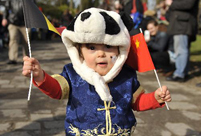 Belgians warmly welcome arrival of China's giant pandas
Belgians warmly welcome arrival of China's giant pandas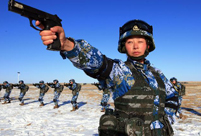 Female marines receive tactical training in NW China
Female marines receive tactical training in NW China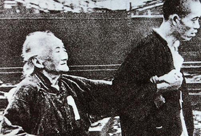 Blood memory: Nanjing Massacre in 1937
Blood memory: Nanjing Massacre in 1937 Top 10 pure beauties in showbiz
Top 10 pure beauties in showbiz British WWII veteran: I can't forgive Japan
British WWII veteran: I can't forgive Japan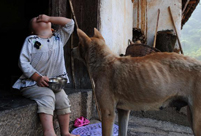 Tongban's dream of prosperity
Tongban's dream of prosperity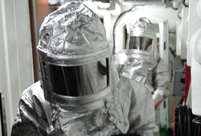 Chinese frigate Yancheng holds drills in Mediterranean Sea
Chinese frigate Yancheng holds drills in Mediterranean Sea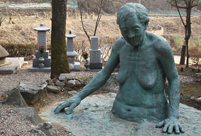 A visit to comfort woman's home in South Korea
A visit to comfort woman's home in South Korea Fairyland? Qingdao in sea of clouds
Fairyland? Qingdao in sea of clouds Top 10 most handsome faces in Asia in 2013
Top 10 most handsome faces in Asia in 2013 Female celebs with beautiful long legs
Female celebs with beautiful long legs Cat 'guardians' in Forbidden City
Cat 'guardians' in Forbidden City Large numbers of ancient coins excavated in Inner Mongolia
Large numbers of ancient coins excavated in Inner Mongolia Leisurely life beneath Zhonggulou, where time travels slower
Leisurely life beneath Zhonggulou, where time travels slowerDay|Week|Month